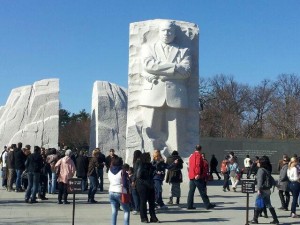 In
August 2011, the Martin Luther King Jr. Memorial in Washington, D.C.,
was unveiled to great fanfare. The site is stunning. But its opening was
met with a minor controversy. A quote by King featured on the memorial
was, in the eyes of many, not accurate. The initial inscription read: “I
was a drum major for justice, peace and righteousness.” In reality, the
line is actually a shortened version of a longer statement.
In
August 2011, the Martin Luther King Jr. Memorial in Washington, D.C.,
was unveiled to great fanfare. The site is stunning. But its opening was
met with a minor controversy. A quote by King featured on the memorial
was, in the eyes of many, not accurate. The initial inscription read: “I
was a drum major for justice, peace and righteousness.” In reality, the
line is actually a shortened version of a longer statement.
The full quote is from a speech King delivered in Atlanta on February 4, 1968:
Yes, if you want to say that I was a drum major, say that I was a drum major for justice. (Amen) Say that I was a drum major for peace. (Yes) I was a drum major for righteousness. And all of the other shallow things will not matter. (Yes) I won’t have any money to leave behind. I won’t have the fine and luxurious things of life to leave behind. But I just want to leave a committed life behind. (Amen) And that’s all I want to say.
According to reports, the shortened version of the quote was chosen by the memorial’s architects to save space. However, there are several differences between the snippet on the memorial and the full version. Most obviously, the shortened version isn’t accurately excerpted from the full quote. It’s a combination of multiple sentences. By our standards, that alone would be considered unacceptable.
But there’s also another problem with the quote in question: it undermines the point King was trying to make in his speech. When the King memorial opened in August 2011, Rachel Manteuffel of the Washington Post explained why this is the case:
This comes at the end of a long and powerful sermon. The speech, called “The Drum Major Instinct,” is about the desire in the human spirit to be great without doing any great, difficult things. To be at the front of the pack, drawing all the attention. This is folly, King says. And then, right at the start of the words at issue, he says, “if.” If ?you want to make me a drum major, then say I was a drum major for justice.
An “if” clause is an extraordinarily bad thing to leave out of a quote. If ?I had to be a type of cheese, being Swiss is best.
As author Maya Angelou told the Post of King, “He had no arrogance at all. He had a humility that comes from deep inside. The ‘if’ clause that is left out is salient. Leaving it out changes the meaning completely.”
Stripped of its context, the quote—which word for word, wasn’t accurate—didn’t capture King’s truly altruistic spirit. And that was a problem. Recently, sculptor Lei Yixin removed the quote from the memorial. (As of mid-August, the full repair was not yet complete.) The change was an expensive one. According to the Associated Press, it cost between $700,000 and $800,000.
From the outset, the well-intentioned creators of the Martin Luther King Jr. Memorial likely would’ve been best served not truncating the quote. After all, sacrificing historical accuracy—even while faced with a space crunch—can be a tricky proposition. Usually, it’s not a risk worth taking.
Photograph © Jamal Rice
